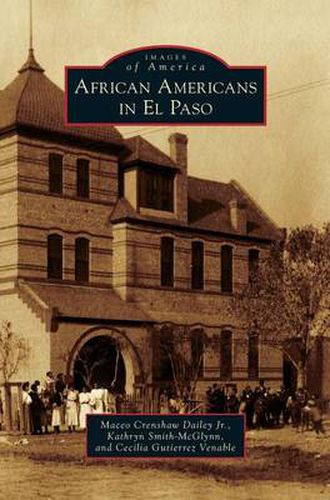Readings Newsletter
Become a Readings Member to make your shopping experience even easier.
Sign in or sign up for free!
You’re not far away from qualifying for FREE standard shipping within Australia
You’ve qualified for FREE standard shipping within Australia
The cart is loading…






This title is printed to order. This book may have been self-published. If so, we cannot guarantee the quality of the content. In the main most books will have gone through the editing process however some may not. We therefore suggest that you be aware of this before ordering this book. If in doubt check either the author or publisher’s details as we are unable to accept any returns unless they are faulty. Please contact us if you have any questions.
El Paso’s African American community can trace its origins back to the 16th century, when the black Moor known as Esteban roamed the southwest and, more significantly, those Africans in the party of conquistador Juan de Onate crossed the Rio Grande in 1598. The modern El Paso African American community began to take shape in the 1880s, as the railroad industry, military establishment, and agricultural community all had black Americans in their ranks. Black leaders and their followers established a school and founded several significant black churches. Texas’s first state branch of the National Association for the Advancement of Colored People is recorded to have been formed in El Paso; the first major court cases that challenged the all-white Democratic primary came from this city; the Texas Western College basketball team won the NCAA championship in 1966 with five starting black players; and today, the city is inhabited by black military retirees, entrepreneurs, educators, and other professionals (each with vibrant and socially conscious organizations), making it a progressive model of community development.
$9.00 standard shipping within Australia
FREE standard shipping within Australia for orders over $100.00
Express & International shipping calculated at checkout
This title is printed to order. This book may have been self-published. If so, we cannot guarantee the quality of the content. In the main most books will have gone through the editing process however some may not. We therefore suggest that you be aware of this before ordering this book. If in doubt check either the author or publisher’s details as we are unable to accept any returns unless they are faulty. Please contact us if you have any questions.
El Paso’s African American community can trace its origins back to the 16th century, when the black Moor known as Esteban roamed the southwest and, more significantly, those Africans in the party of conquistador Juan de Onate crossed the Rio Grande in 1598. The modern El Paso African American community began to take shape in the 1880s, as the railroad industry, military establishment, and agricultural community all had black Americans in their ranks. Black leaders and their followers established a school and founded several significant black churches. Texas’s first state branch of the National Association for the Advancement of Colored People is recorded to have been formed in El Paso; the first major court cases that challenged the all-white Democratic primary came from this city; the Texas Western College basketball team won the NCAA championship in 1966 with five starting black players; and today, the city is inhabited by black military retirees, entrepreneurs, educators, and other professionals (each with vibrant and socially conscious organizations), making it a progressive model of community development.